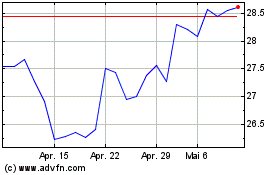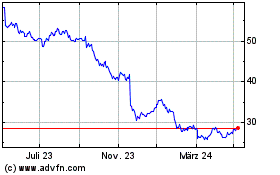Bayer to Cut More Costs as Farm Business Hurts
01 Oktober 2020 - 12:01AM
Dow Jones News
By Ruth Bender
BERLIN -- Bayer AG unveiled on Wednesday billions in new costs
cuts to offset falling demand in agricultural products -- the
market on which it had made a huge bet with its acquisition of
Monsanto.
The German chemicals and pharmaceuticals company said the
coronavirus pandemic would hit its crop-science business harder
than anticipated as prices for various crops fell, consumption of
biofuel decreased and competition in the soy market
intensified.
Bayer, which spent $63 billion on Monsanto in 2018, said that it
didn't expect market conditions to improve considerably in the
near-term and that this would likely reduce the value of its
crop-science business through impairment charges in the
"mid-to-high single-digit billion-euro" range.
The company said it wouldn't meet its 2021 sales and cash-flow
targets as the savings wouldn't completely offset declining sales.
Bayer now expects sales to be flat next year instead of growing at
roughly 4%, and sales this year to grow between 0% and 1% to
between EUR43 billion and EUR44 billion, equivalent to between
$50,4 billion and $51,6 billion, excluding currency effects.
Bayer's strategic expansion into agriculture has been mired in
setbacks from the start. The acquisition of Monsanto exposed the
German company to tens of thousands of plaintiffs suing the maker
of Roundup weedkillers, alleging the herbicide causes cancer.
Bayer in June said it had reached deals to settle the bulk of
cases before talks on finalizing these settlements stalled. Bayer
said earlier this month it was making progress on a final deal.
The company is reworking a complex but crucial part of the
settlement that would address future Roundup cases. Bayer says
Roundup is safe and doesn't cause non-Hodgkin lymphoma.
The legal woes have weighed on Bayer's share price and sparked a
shareholder revolt last year, but the company's board has stood
behind Chief Executive Werner Baumann, the main architect of the
Monsanto deal. Earlier this month, the board extended his contract
until 2024.
Bayer said the pandemic-induced weakness in the agricultural
market hadn't weakened its commitment to that part of the
business.
"Despite the difficult market environment, the urgent need for
innovative healthcare and agriculture solutions has never been more
evident," Mr. Baumann said.
Bayer said the need for additional savings might lead to more
job cuts. They come on top of existing plans to cut $2.6 billion in
annual costs from 2022, which include a 10% cut to its
workforce.
Additional cash generated through these savings would be
invested in innovation, improving margins and bringing down debt,
Bayer said. The company said it was still seeking opportunities to
boost its pharmaceuticals division with bolt-on acquisitions or
deals to license products in development. Bayer also said it would
seek small acquisitions in its consumer-care division, a unit that
had been struggling in the past but which Bayer said had performed
strongly recently.
Write to Ruth Bender at Ruth.Bender@wsj.com
(END) Dow Jones Newswires
September 30, 2020 17:46 ET (21:46 GMT)
Copyright (c) 2020 Dow Jones & Company, Inc.
Bayer (TG:BAYN)
Historical Stock Chart
Von Mär 2024 bis Apr 2024

Bayer (TG:BAYN)
Historical Stock Chart
Von Apr 2023 bis Apr 2024
